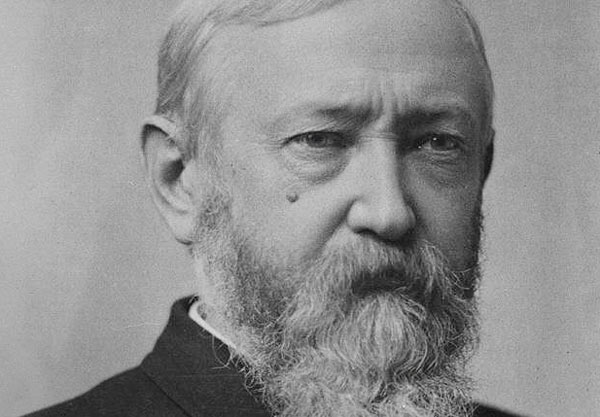Benjamin Harrison was born August 20, 1833, in North Bend, Ohio. He was one of eight children. His grandfather was ninth president and war hero William Henry Harrison and his great grandfather was Benjamin Harrison V, a Virginia governor and signer of the Declaration of Independence. Despite his prestigious family lineage, Benjamin's family was not wealthy and he attended school in a single-room schoolhouse.
In 1852, Harrison graduated from Miami University (Ohio) and studied law afterwards. In 1853, Harrison married Caroline Lavinia Scott. The couple would have two children, Russell and Mamie, both of which would live to adulthood. The following year, the couple moved to Indianapolis, Indiana, where Benjamin practiced law and became interested in politics. As Harrison's law practice became more successful, his political prospects improved among the Republican Party. During the Civil War, despite no military experience, Harrison commanded Union brigades in several battles in Georgia toward the end of the war. In 1865, President Lincoln nominated Harrison to the grade of brevet brigadier general.
After the war, Harrison had become a wealthy and respected lawyer. After an unsuccessful bid to become governor of Indiana, he was elected as the state's Senator in 1880, a position which he held until 1887, before being defeated in a bid for re-election. Harrison, however, was nominated by the Republican Party as President in the election of 1888 against Grover Cleveland. In a tightly contested battle, Harrison lost the popular vote, but won the presidency in the electoral college. Political opponents would assert that Republicans bought the votes of electors to get Harrison elected.
During Harrison's presidency, Congress passed the Sherman Antitrust Act, which prohibited companies from engaging in monopolistic (anti-competitive) behaviors. In this way, customers could have choices between service providers, giving companies incentives to improve services and price competitively. Congress also passed the McKinley Tariff, which was designed to protect domestic industries from foreign companies by raising duties (taxes) on imports. During his presidency, Harrison repeatedly championed for civil rights for African Americans and introduced legislation that would have provided federal funding to school regardless of the races such schools served. None of his measured however, made it through Congress successfully. Despite the positive steps forward made during his term, the nation's overall economic conditions worsened and support for Harrison dwindled in the Republican Party. Harrison would be defeated in his quest for re-election by Grover Cleveland. Grover Cleveland would become the first and only president to serve two non-consecutive terms as president.
Following his presidency, Harrison continued his legal work and served on the board of trustees at Purdue University. He died on March 13, 1901, of complications from influenza.
|












































